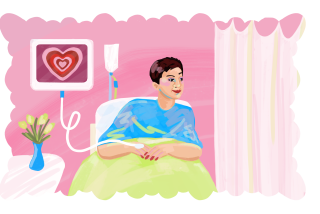A Problem Next Door Turns Strangers Into Friends
It began as one of those Southern California stories we all understand and that often have bad endings: You’re an angel, but your next-door neighbor is an agent of the devil sent to make your life miserable.
You can’t live with ‘em, and you certainly can’t kill ‘em . . . so all you can do is suffer.
At least, that’s what Debbie D’Arrigo thought. “It started out on a real sour note,” she says, recalling the neighbors who moved next door to her Lake Forest condominium complex in late 1997.
The new residents were a young woman, her infant child and her boyfriend. And, worst of all, they attracted a seemingly endless supply of visitors. “It was a party house from Day 1,” D’Arrigo says. “Twenty-four hours a day.”
She complained to the condo association, to no avail. She complained numerous times to the Sheriff’s Department, but not much happened. “It got to the point,” she says, “where I was going to my parents’ house and even my ex-husband’s to get some sleep. Finally, my parents said, ‘You need to do something, this is ridiculous.’ They were right, but I didn’t have a clue what direction to go.”
How about a lawyer, her parents said. D’Arrigo agreed, but all that implied to D’Arrigo was a potential confrontation with her next-door neighbors that she didn’t welcome.
Instead, fate intervened.
It began when her lawyer suggested she ask other neighbors if they’d experienced similar problems. D’Arrigo had lived in the complex about a year but hadn’t struck up a single friendship. She wasn’t anti-neighbor; she just considered herself introverted and unmotivated to meet others.
“Everybody is so busy,” she says. “Besides, the people next to me weren’t real good, so I was thinking, ‘What if some of the others aren’t real good either?’ ”
She girded herself to knock on doors. “I had to talk myself into it,” she says. “I had to pick a place and go for it.”
But as she started asking around, her neighbors immediately knew who the culprits were. One of them said she’d called the cops once too.
The more they talked, walls came down. All the faceless, anonymous people D’Arrigo had never seen or known became friends.
Roxanne had cancer and had been taking radiation therapy. Her son was recently baptized. She and D’Arrigo began taking evening walks together.
Kim was a schoolteacher. D’Arrigo now feeds her cats when she’s gone.
Irene was even shyer than D’Arrigo, but the two began taking walks occasionally and recently went to a crafts fair together. D’Arrigo learned she’d gone to the same high school as Irene’s husband, Dan, and that religion is a central part of their lives.
Cecile had major cancer surgery six weeks before D’Arrigo met her.
Delia lost a newborn shortly after its birth.
D’Arrigo now refers to cancer survivors Roxanne and Cecile as “my heroes.” She and Roxanne are going on a three-day cruise to Ensenada in May.
The sense of community, of shared knowledge of each other, took D’Arrigo, 45, back to her roots.
“I grew up in Fullerton,” she says. “Everybody in the neighborhood was at our house. I had a great childhood, and I knew all the neighbors.” Her parents still are friends with people they’ve known since her childhood, she says.
D’Arrigo, who manages UC Irvine’s Sign Shop, understands why people in contemporary Southern California don’t make time to know their neighbors.
“We all work and have families on top of it,” she says. “So, when you’re not working, you’re trying to spend quality time with your children. And I think neighbors and friends sometimes tend to be put on the back burner, so to speak, until something like this comes along and reality wakes you up.”
In time, the noisy neighbors moved away. It hardly mattered, because what D’Arrigo once referred to as “10 months of hell” disappeared under the importance of her newfound friendships.
“It’s just been something wonderful that’s happened,” she says. “I’m really so grateful in a way that the bad part happened, because I never would have gotten to know these wonderful people.”
Dana Parsons’ column appears Wednesday, Friday and Sunday. Readers may reach Parsons by calling (714) 966-7821, by writing to him at The Times Orange County Edition, 1375 Sunflower Ave., Costa Mesa CA 92626, or by e-mail at [email protected].


